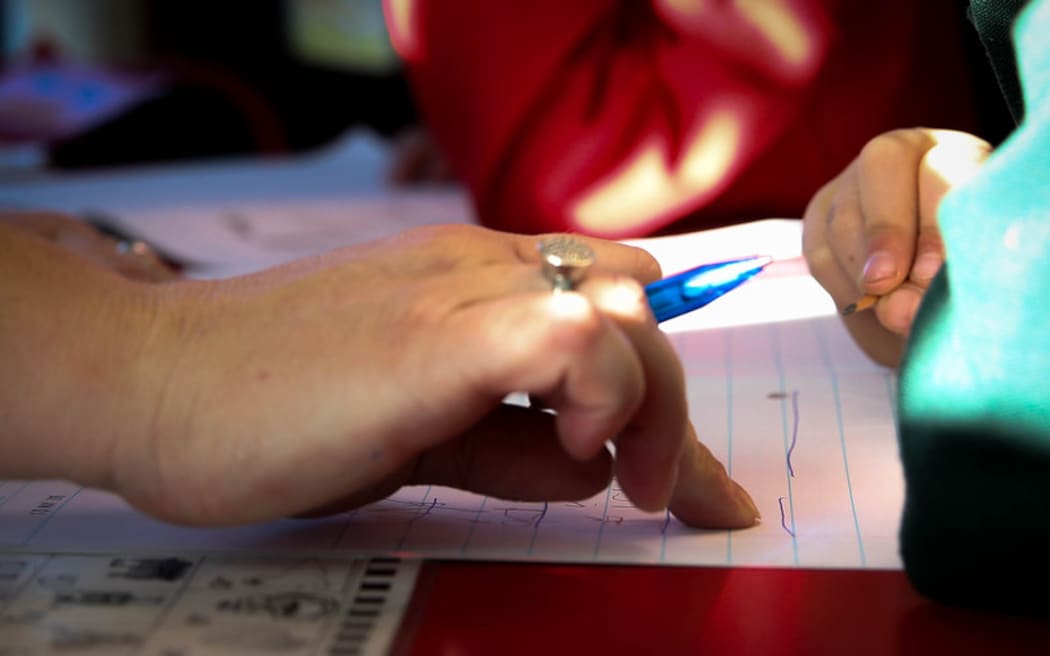This year's achievement rates in the national standards in reading, writing and maths will remain a mystery after the government began the process of ditching the standards.

Teacher and student at Linwood Primary School, Christchurch. Photo: RNZ / Alexander Robertson
Education Minister Chris Hipkins announced schools would not have to report their 2017 results to the Education Ministry and would not be required to use or report on the standards next year.
The previous government has used the annually reported figures to track changes from year to year in national standards' achievement rates.
Mr Hipkins said the government would develop a new system to replace the standards next year in consultation with teachers and principals.
Former Education Minister, National Party MP Nikki Kaye, said the government had taken a "nuclear approach" in moving so quickly to abolish the benchmarks.
"It's a very sad day for New Zealand. We've got the minister making a decision that affects hundreds and thousands of children and their parents without consulting with parents," she said.
Ms Kaye said the decision would leave a gap in national information about children's performance at school and parents would not know how their children's achievement would be reported next year.
But Mr Hipkins said parents and teachers were expecting the announcement.
"I don't think anyone will be surprised that we are ditching a failed experiment," he said.
Mr Hipkins said the standards had created an enormous amount of work for teachers, with no discernible gain.
"We want teachers focused on less testing and more teaching because that's the way we're going to improve students' progress."
Mr Hipkins said teachers would still be expected to make overall judgements about children's achievement and parents would get better information about children's progress.
He said schools could continue to use the standards if they wanted to.
New Zealand children's performance in international tests had declined since the standards were introduced in 2010, and reporting results to the Ministry of Education was little more than a compliance exercise, Mr Hipkins said.
The standards took a hit at the start of December with the publication of results that showed 10-year-olds' reading achievement had declined since their introduction.
New Zealand's average score in the Progress in International Reading Literacy Study had been steady for 15 years, but dropped sharply in testing conducted at the end of 2015, plunging New Zealand from 23rd to 33rd out of 50 countries.
Treasury recommended retaining the standards until replacement ready
A Cabinet paper published today said the new system would measure children's progress and focus on "key competencies for success in life, learning and work".
It said in the meantime the government would require schools to report on children's progress as well as achievement with an emphasis on good quality information from a range of sources.
"This will help reassure parents and whānau that the removal of Nga Whanaketanga Rumaki Māori and National Standards will not reduce the information available to them," the cabinet paper said.
The paper showed Treasury supported the plan to measure children's progress against a wider range of subjects, but warned that dumping the standards would create a gap in national information about children's achievement.
It recommended retaining the standards until the replacement system was ready.
"Systems level information on primary school performance is critical to the Ministry and the ERO to identify whether there is a need for changes in education policy settings, as well as to identify which schools may need additional support or intervention. Without this intervention, systematic issues may not become visible until NCEA, which is too late for effective intervention," Treasury told the government
However, Mr Hipkins responded that national standards had not been providing reliable national-level information because they were "neither national nor standard".
The paper showed the government had asked the Education Ministry to redesign a computer system that helped teachers make accurate judgements about children's achievement against the standards so that it could instead be used to measure children's achievement and progress against curriculum levels in "foundational learning areas".
It said the government was also stopping the transfer of responsibility for teachers' professional development courses and training to the Education Council.
The paper said the Education Minister wanted to consider instead the development of a national advisory service to oversee all centrally-funded training.
An education professor says scrapping national standards is a good turn of events for schools as they were flawed and poorly developed.
Martin Thrupp, a professor of education at Waikato University, said there was an enormous amount of work for teachers in justifying their assessments and in senior staff moderating them under national standards.
"It's a very busy system. It has a kind of simplistic, crude four point scale - children are labelled well below, below, at or above but behind that is an enormous amount of work," he said
"The amount of time that teachers put into shoring up the overall teacher judgements to make those determinations was a distraction from teaching and learning I think.
"Testing or having some sort of assessment of children twice a year every year and that being reported nationally - even in places like Australia it's only at 3,5, 7 and SAT testing the UK is not every year."
He said there were many other measures available to teachers and the government should consult properly on what it did next in monitoring student achievement.





